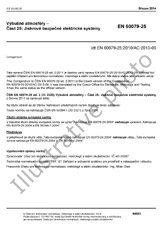We need your consent to use the individual data so that you can see information about your interests, among other things. Click "OK" to give your consent.

IEEE 1890-2018
IEEE Approved Draft Standard for Error Correction Coding of Flash Memory Using Low-Density Parity Check Codes
Translate name
STANDARD published on 6.2.2019
| Availability | Sold out |
| Price | ON REQUEST excl. VAT |
| ON REQUEST |
The information about the standard:
Designation standards: IEEE 1890-2018
Publication date standards: 6.2.2019
SKU: NS-936184
Approximate weight : 300 g (0.66 lbs)
Country: International technical standard
Annotation of standard text IEEE 1890-2018 :
New IEEE Standard - Active.
This draft standard specifies a two-level code construction scheme for non-volatile memories (NVM) that is based on low-density parity-check (LDPC) codes. This scheme constructs an auxiliary codeword that encodes a subset of bits from the primary packets stored in an NVM memory unit. The auxiliary codeword is decoded only when the detection of at least one of the primary codewords fails. The encoding and decoding techniques for this scheme are presented. The two-level scheme outperforms the traditional one-level method while it requires only a small memory overhead and negligible latency. Moreover, it outperforms the one-level scheme that uses a code that is twice as long in the low raw bit error rate (RBER) regime.
ISBN: 978-1-5044-4936-6, 978-1-5044-4936-6
Number of Pages: 56
Product Code: STDUD23143, STDAPE23143
Keywords: Flash memory; two-level code construction; low-density parity-check codes; auxiliary codeword.
Category: Computer Hardware/Design and Test
Draft Number: P1890/D2, Sept 2017 - UNAPPROVED DRAFT, P1890/D2, Sept 2017 - APPROVED DRAFT
We recommend:
Technical standards updating
Do you want to make sure you use only the valid technical standards?
We can offer you a solution which will provide you a monthly overview concerning the updating of standards which you use.
Would you like to know more? Look at this page.



 Cookies
Cookies
